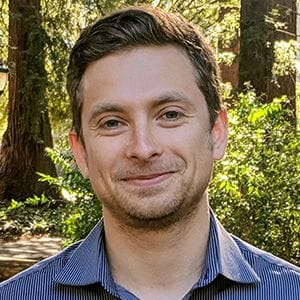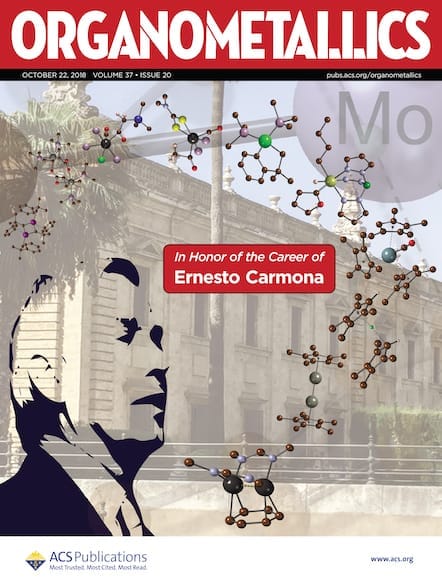Dr. Zhukhovitskiy is recognized for utilizing organometallic catalysis directed toward carbodiimide and diazene polymerization. Learn more about his exceptional research in this exclusive interview.

Organometallics, in partnership with the ACS Inorganic Chemistry and Organic Chemistry divisions, is proud to announce Aleksandr (Alex) V. Zhukhovitskiy, of the University of North Carolina at Chapel Hill, as the winner of the 2025 Distinguished Author Award.
This award recognizes authors of exceptional articles published in Organometallics in the previous two calendar years that emphasize the importance of organometallic chemistry and have had a profound impact on the field. Dr. Zhukhovitskiy is recognized for utilizing organometallic catalysis directed toward carbodiimide and diazene polymerization.
Dr. Zhukhovitskiy will be honored during the ACS Fall 2025 Meeting, taking place August 17-21 in Washington, D.C. and online. Learn more about his research below.

Dr. Zhukhovitskiy was born in Dnipro, Ukraine, and immigrated to the U.S. at the age of 11. He completed his undergraduate studies in Chemistry, Mathematics, and the Integrated Science Program at Northwestern University, earning a joint B.A./M.S. degree in Chemistry in 2011.
During the next five years, Alex conducted doctoral research in the laboratory of Professor Jeremiah A. Johnson in the Department of Chemistry at the Massachusetts Institute of Technology, and from 2016 till 2019—postdoctoral research in Professor F. Dean Toste’s group in the Department of Chemistry at the University of California, Berkeley. In 2019, Alex started his research group in the Department of Chemistry at the University of North Carolina at Chapel Hill, where he is currently an Assistant Professor and William R. Kenan Jr. Faculty Fellow.
Research in the Zhukhovitskiy group is focused on addressing fundamental challenges at the interface of polymer, organometallic, and organic chemistry. Applications of this research include polymer sustainability, tissue engineering, and solar energy capture and conversion. For his group’s work, Alex has been recognized with the Army Research Office, Air Force Office of Scientific Research, Department of Energy, and National Science Foundation Early Career Awards, as well as the Thieme Chemistry Journals Award, 3M Non-Tenured Faculty Award, PMSE Early Investigator Award, Sloan Research Fellowship, and most recently, the Organometallics Distinguished Author Award.
Read the Interview with Dr. Zhukhovitskiy
What does being recognized by this award from Organometallics mean to you?
This recognition is certainly humbling, considering the stature of Organometallics in this field, who has received this award in the past, and the magnitude of their contributions. Yet, this award means more to me than that. Some in my professional circles have had me pegged as a “polymer person” to the exclusion of other expertise; more importantly, my label is often projected onto my students by potential employers, which can limit their opportunities. The truth is, I train my students to operate at the interface of polymer, organometallic, and organic chemistry to address fundamental challenges in those spaces. So, this award is particularly meaningful to me because I hope it will help the broader scientific community see my group as also “organometallics people.”
What inspired you to pursue your field of research? How would you describe it to someone outside your field?
Prof. SonBinh Nguyen, one of my undergraduate research advisors, sparked my interest in organometallic chemistry and its interface with polymers. From SonBinh, I learned about ring-opening metathesis polymerization and Ziegler-Natta polymerization of olefins, beautiful chemistry that has revolutionized the plastics industry, and at the heart of it all—a transition metal with a bond to a carbon. In essence, that is what my field is about: developing a deeper understanding of the reactivity of such organometallic complexes to unlock new ways to construct and deconstruct plastics and, thereby, to positively impact the broader community.
What advances are you hoping to see in your field in the next decade?
I hope to see advances in how organometallic chemistry impacts every aspect of the polymer lifecycle. For instance, I hope to see discoveries of organometallic polymerization mechanisms that would grant access to new functional materials; likewise, I look forward to new organometallic modifications of polymers, as well as deconstruction of recalcitrant polymeric materials, which will require advances in our understanding of fundamental transformations like activation of carbon-carbon sigma bonds by transition metal catalysts.
What do you think is the biggest challenge currently in your area of research?
The biggest challenge in the world of hetero-ene metathesis and metathesis at large is to develop more sustainable catalysis based on abundant transition metals like iron.
Please tell us about your global career path.
I was born in Ukraine, and my chemical education started at a young age with my father—himself a chemist—who introduced me to the elements and the foundations of organic chemistry. I immigrated to the U.S. with my family at the age of 11, and after completing my primary and secondary education, I pursued undergraduate studies at Northwestern University, supervised briefly by Prof. Tobin Marks and then by Prof. SonBinh Nguyen. After earning a joint B.A./M.S. degree, I left the Midwest for the East Coast to pursue a Ph.D. in Chemistry supervised by Prof. Jeremiah Johnson at MIT. Next stop was the West Coast for postdoctoral studies in Prof. Dean Toste’s group at UC Berkeley, and then in 2019 I then started my independent career in the Department of Chemistry at UNC Chapel Hill, where I’ve been since.
What do you wish you knew before you started studying organometallics?
I wish I had some exposure to industrial organometallic processes. To be honest I have yet to visit a large plant—for instance, a propylene polymerization plant—but even the videos of such processes are astounding: seeing them, it’s hard not to appreciate the power of organometallic chemistry.

